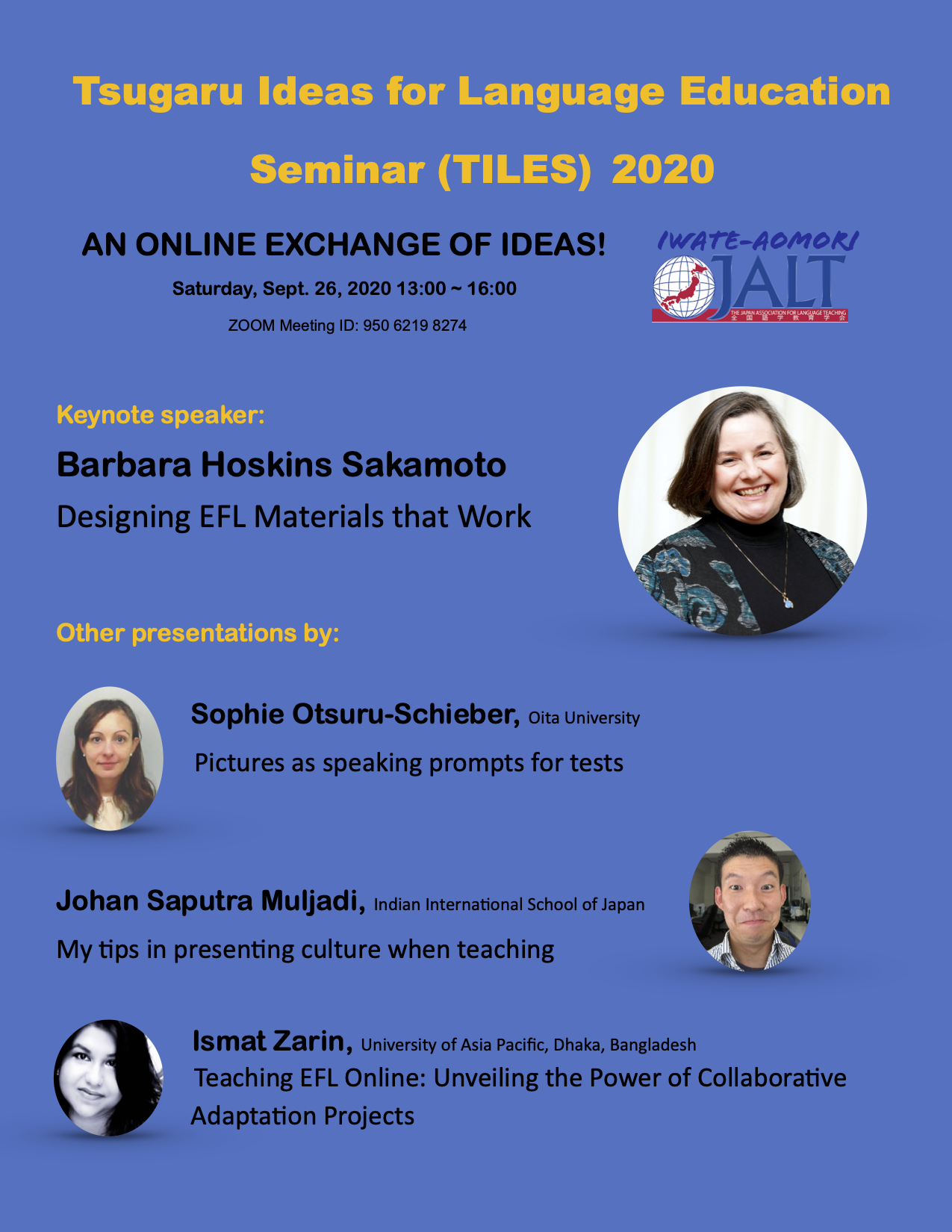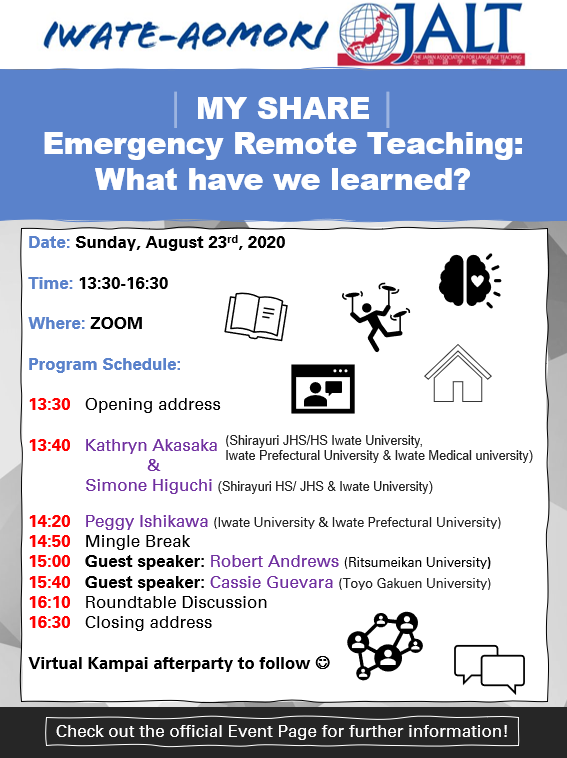
Event page
https://www.facebook.com/events/3000812170199464/
Event Theme: An Online Exchange of Ideas.
Keynote: Barbara Hoskins Sakamoto
Title: Designing EFL Materials that Work
Abstract: Let’s Go has the distinction of being the first EFL course book series for children, and of remaining one of the world’s best-selling course books through five editions for nearly 30 years. As co-author, Barbara has seen trends come and go in materials design for young learners, but some fundamentals have withstood the test of time. She will talk about these in terms of guidelines that can help teachers create effective EFL materials, whether for learners in their own classes or for learners in classrooms around the world. Participants will then apply these guidelines in turning content into coursebook pages. Barbara will bring material for participants to work with, but if you have a coursebook you’d like to analyze and perhaps improve based on the guidelines we explore, please bring it along with you to this session. The principles covered will apply to materials for all levels of learners.
Presentations:
Sophie Otsuru-Schieber Oita University
Title : Pictures as speaking prompts for tests
Abstract: To assess speaking skills many options are available: roleplay, individual or group presentations, flashcards or picture description. In this presentation I will argue in favour of the final option: using pictures as speaking prompts. Because picture description tasks represent a real challenge for students who need a framework to display the extent of their language capacities and show some fluency, I will suggest an ideal framework that has worked particularly well for the Pearson Progress Test. The second part of the presentation will offer participants time to do the task themselves, record their performance, assess it, and discuss their performance in small groups. I will conclude with descriptors for 2 levels: CEFR A2/B1 and B2.
Johan Saputra Muljadi – Indian International School of Japan
Title: My tips in presenting culture when teaching
Abstract: 1. Learn new words in students’ mother tongue language. Here’s a fun warm up, I will say random words in a foreign language, please guess what language it is and what does it mean. 2. Don’t be afraid in asking your friends when facts checking. Did you know that in Russia, children study 6 days a week, have 3 months summer break and have accelerated program for gifted children? Did you know that Cairo, the capital city of Egypt is flooded with Iranians, Iraqis and Africans? The tariff is pretty high for those who are crossing the Red Sea which contributes heavily to the Egyptian economy. 3. As teachers, it is important to expand our network. Balance between enjoying your time alone and networking. I have itchy feet so working at different places allow you to meet new colleagues/friends and you can truly expand your teaching horizon. 4. If you have the luxury of money and space, be a collector. I’m a banknote collector and this allows me to be more social. I have over 500 different banknotes and as a Social Studies teacher, this makes my job easier. 5. Kill two birds with one stone, build your brand. Yes, it is important to focus on the students but it is as important to focus on you like what I’m doing now, giving a presentation to an audience. I recommend building your own website and keep a record, and when people can find you, (such as Marek Kiczkowiak), teaching culture becomes more interesting.
Ismat Zarin – University of Asia Pacific, Dhaka, Bangladesh
Title: Teaching EFL Online: Unveiling the Power of Collaborative Adaptation Projects
Abstract: Adaptation of a text is a creative skill which needs critical thinking and sound language skills. Keeping this notion into consideration, this research paper sheds light on the applications of collaborative adaptation projects in the online teaching of EFL (English as a Foreign Language). For the purpose of the study, the teacher researcher designed an adaptation project work for 30 EFL learners in their first-year undergraduate studies at a private university in Bangladesh attending an online semester due to COVID-19. In the project, they had to adapt the video broadcasts of television news into written news reports. After the completion of the group project, the learners filled a semi-structured questionnaire assessed on a Likert scale which focused on their experience in the group project. Apart from that, the subjects were also interviewed online to disseminate information about the experience and the opinions of the subjects with regard to the project. As was found in this study, such a group project provides a lot of space for the students to do collaborative work even while learning online while developing EFL writing skill and develop their critical thinking skills with the help of peers and the instructor.

